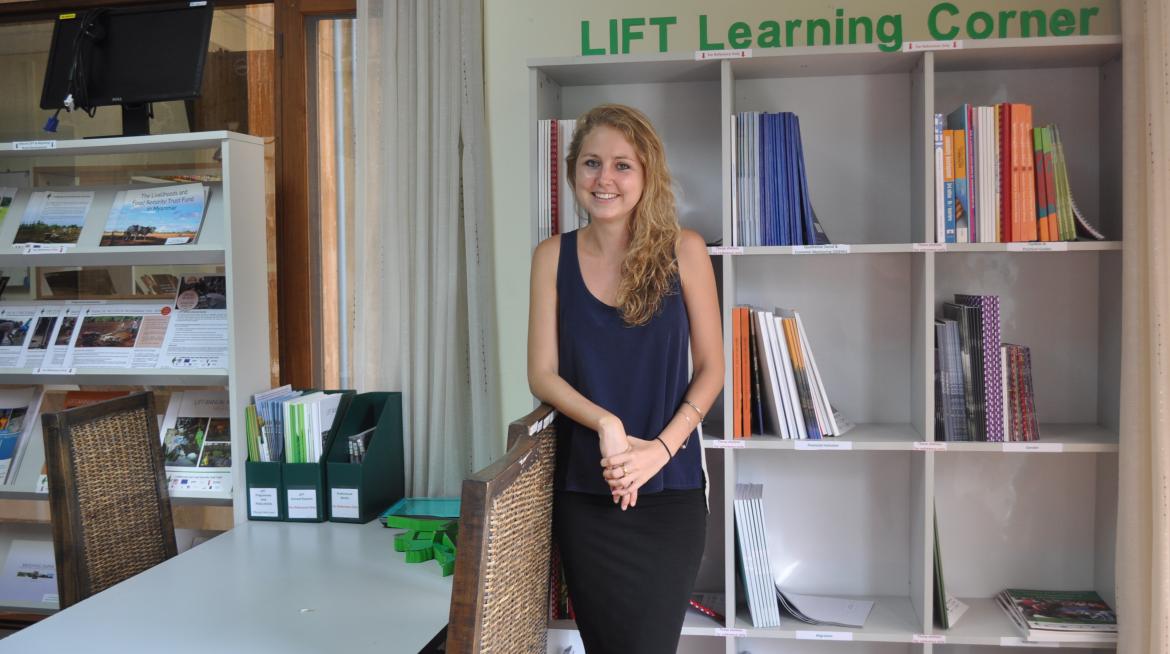
Launching LIFT’s feature of the month, where we interview Fund Management Office staff and implementing partners so that you can learn more about LIFT’s vibrant team, their development goals in Myanmar and get a better understanding of how LIFT contributes to development and pro-poor policy in Myanmar. August features Sophie Rigg who joined LIFT in April 2016 as the Knowledge Development Analyst.
LIFT: Tell me about how you first got involved with the development sector?
I always had a keen interest in development. The first time I worked in development was with a HIV/AIDS programme in Malaysia straight after my undergraduate degree. Prior to this I volunteered in Malawi in orphanages and on development focused photography exhibitions in South Africa. I have also worked in conservation in Ecuador and Nicaragua. My interests and work in development have often focused on climate change, shaped by watching documentaries such as An Inconvenient Truth. This led me to undertake a Masters in Disasters, Adaptation and Development and go on to work on two Building Resilience and Adaptation to Climate Extremes and Disasters (BRACED) projects in Ethiopia and Burkina Faso from 2014-16.
LIFT: What is your role within LIFT? Why is it important?
Knowledge management is a new unit within LIFT and is in line with the new strategy (2014-2018). LIFT has been active since 2010 and has generated a lot of robust evidence on how to do development in Myanmar. The knowledge management unit aims to bring a more systematic approach to learning to ensure that we use what we are learning to improve the way that we work and to upscale our impact.
One of my roles that I think is particularly important is learning from the implementing partners (IPs). So far I have been on field trips to the Dry Zone and had meetings here in Yangon with some of our IPs. I would like to spend more time meeting with them so that they can get to know me and so that I can learn more from them. I am currently working on mapping LIFT’s IPs and their projects to understand where LIFT is generating robust knowledge and how this can contribute to the policy work that we are doing.
The value of knowledge management is more recognized within development now. It is much more then data management, it is about learning and doing things better. I believe that this is important in order to make sure that we do not reinvent the wheel and that we learn from our failures as well as our successes.
LIFT: What was your first impression of LIFT?
LIFT has an impressive, dynamic team – things get done and move forward. LIFT is good at handling UNOPS bureaucracies. There is obviously bureaucracy involved with managing programmes but everything is done with good reason and the team makes it flow well. Things do not stagnate at LIFT.
LIFT: What has surprised you most about working with LIFT?
How actively involved the Fund Board are. They provide valuable and strategic input into how LIFT is run and are all experts in areas that are relevant to LIFT’s programmes. The Fund Board is also very important for ensuring that LIFT has greater reach within government and policy development.
LIFT: Tell me about some of the people you’ve met while working at LIFT?
I have met some very interesting people out in the field – specifically Social Policy and Poverty Research Group (SPPRG) who work in the Dry Zone. They have a remarkable team of officers and interns who have been newly trained by SPPRG. They all have a passion for development and the sector and are doing great work.
LIFT: Does LIFT provide enough engagement/interactive events?
I would like to see as many as possible. I do recognize there is a lot of IPs working in very different areas and getting together without a clear purpose can be a waste of everybody’s time. Therefore these event and workshops must be strategic and targeted. This is something I will be working on during my time at LIFT.
LIFT: Which other organisations do you know have a good grasp on knowledge management?
BRACED, which I used to work on, have a large knowledge management unit and I have learnt a lot from their approach. They will generate interesting learning on resilience and how to do development but they also work across many countries so it can be difficult for them to be targeted. LIFT faces this challenge with themes; we work in a single country which enables great potential for knowledge generation and sharing, but we work across many areas from nutrition to financial inclusion to land tenure.
What challenges will LIFT face over the next two years?
Myanmar is changing so fast and there is a constant need to adapt and work with these changes, which present both challenges and opportunities. We also have to deal with a lack of data and knowledge on development in Myanmar. There is more data available now than before but it remains a challenge.
What will change about LIFT over the next two years?
I think that LIFT will become more effective and innovative. We are expanding in areas of policy, advocacy and knowledge management and will see the benefits of these changes over the next two years. Key focus areas will be more defined and we will be more targeted and systematic whilst also remaining flexible and adaptive.
LIFT: What might someone be surprised to know about you?
I made a short documentary film in London about homelessness. I would perhaps like to return to a career in documentary film making later on.
LIFT: What do you do when you aren’t working?
I go to the gym, or enjoy reading a book with a glass of wine in a quite café or bar.


